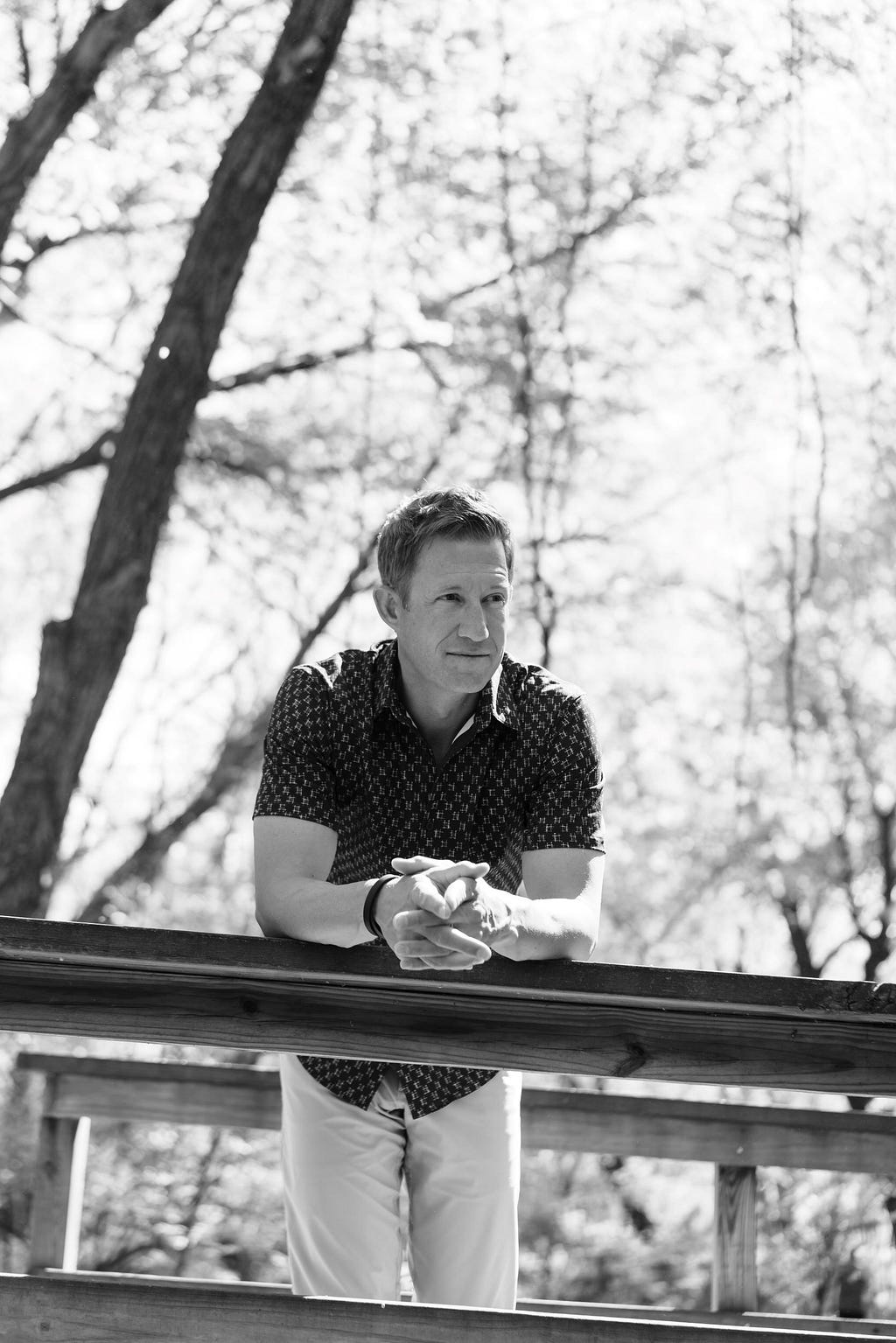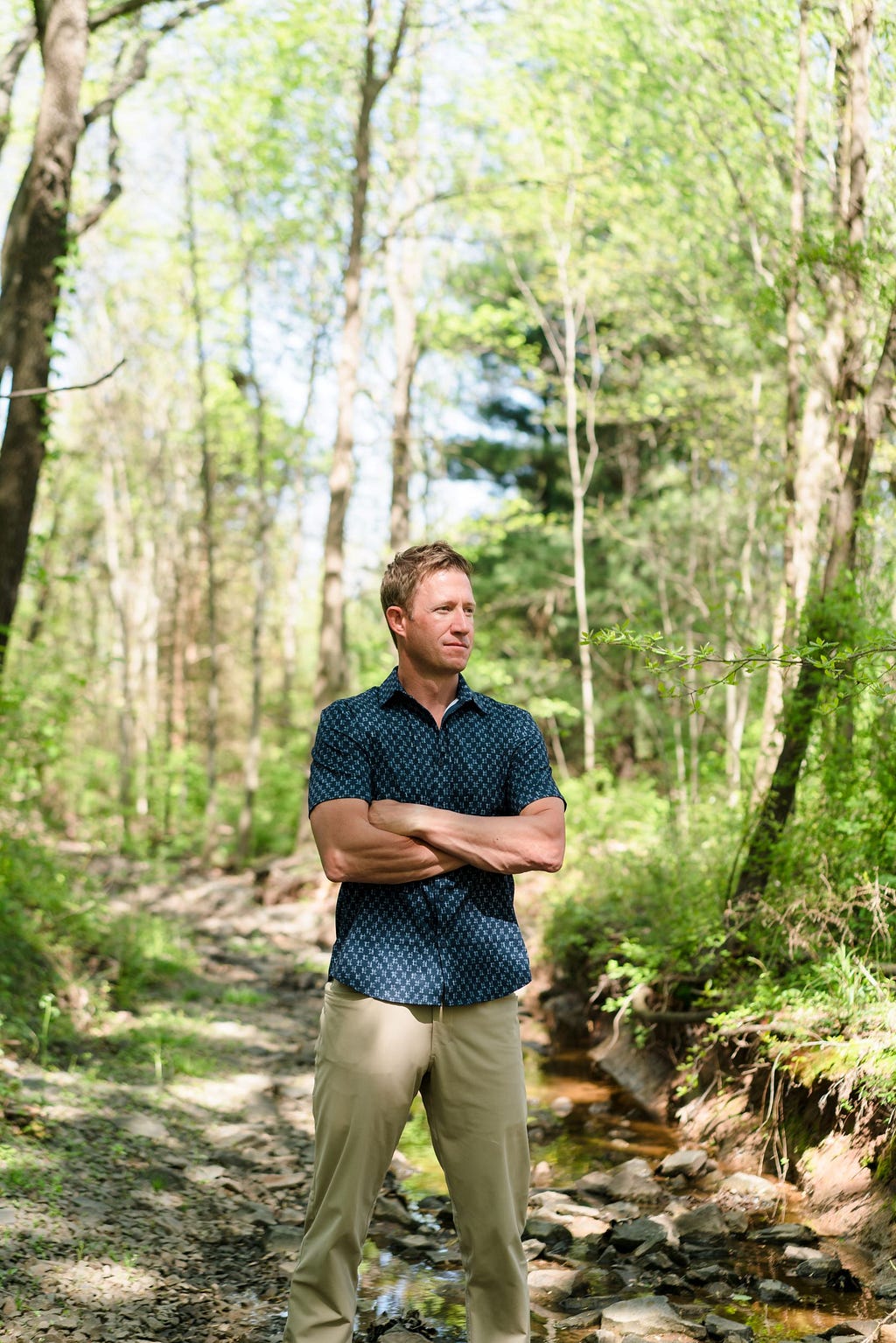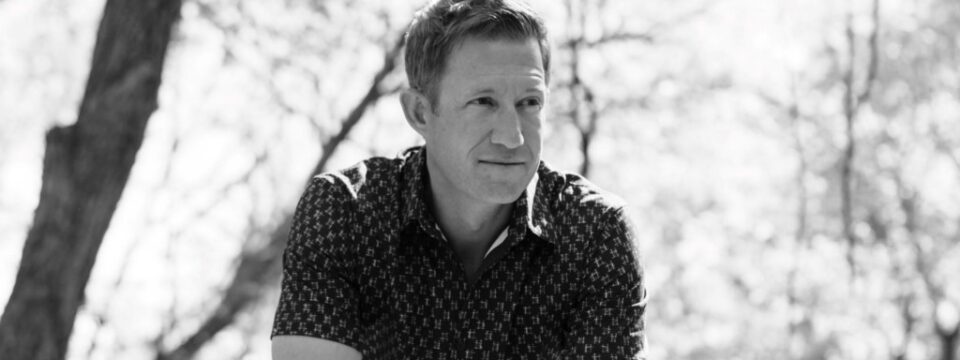
Take notes, journal, dictate thoughts and emotions as they come up, because these are the fountains of inspiration and creativity. These are the most real thoughts and feelings in the moment. Don’t try to write from beginning to end. Just get things out of your heart and head and onto paper. The rest will take care of itself.
As part of my series about “authors who are making an important social impact”, I had the pleasure of interviewing Daniel Stuart Olmes, , author of Memoirs of an Ordinary Guy: The Everyday Experiences that Changed My Life (Post Hill Press; January 2023; Paperback; ISBN: 9781637587317)
Daniel Stuart Olmes is a husband, father of twins, entrepreneur, and aerospace and defense executive residing outside of Washington, DC, in the Northern Virginia suburbs. Currently the president and chief operating officer of a mid-sized government contractor, he is an avid reader, fitness enthusiast, and volunteer, spending most of his time on the baseball field as a Little League coach and watching his kids’ sports. He’s founded two companies: Middleburg Capital, a commercial real estate investment firm, and Hellen Systems, a technology company focused on a national security initiative to create a ground-based back-up for the Global Positioning System (GPS). He earned a bachelor’s degree in biology at Virginia Tech in 2000.
Thank you so much for joining us in this interview series! Before we dive into the main focus of our interview, our readers would love to “get to know you” a bit better. Can you tell us a bit about your childhood backstory?
Absolutely! And thank you again for this interview. I’m grateful for the opportunity. I grew up in a suburb of Washington D.C. At the time, this was still a developing area of Northern Virginia and one of the first planned communities — “a place called Reston.” My father was a civil servant for the federal government and my mother worked for a local thrift store and was responsible for giving free clothes to people in the community. I think from an early age I learned how other people lived, especially in my own community. Although I grew up in a beautiful home, my parents didn’t have a whole lot of extra money. That being said, I learned to appreciate that I lived in abundance, and was grateful for what I had and for the perspective I had for others. I was also an only child, which taught me the importance and burden of solitude. I had a lot of friends. I felt love from many, many people, but I learned how to sit with myself and reflect on a lot of things in my life. In the end, solitude was perhaps one of my greatest teachers early on. As such, I became an observer of the world around me, something that made it possible to write my first book Memoirs of an Ordinary Guy: The Everyday Experiences that Changed My Life, which is a personal journey that focuses on the importance and power of the ordinary events of our lives.
When you were younger, was there a book that you read that inspired you to take action or changed your life? Can you share a story about that?
It’s funny. I wasn’t a good reader when I was younger. In fact, it was something I struggled with. The attention span, sitting still, retaining what I read, and trying to tame a wandering mind were all too much, but my dad was a big reader, and I was surrounded by adventure stories, classics, mysteries, history books, and they all had colorful and intriguing covers. They drew me in with their imagery and intrigue, and I yearned for their adventure and escape. But because it was so difficult for me, reading was not something I enjoyed. All that said, I developed a passion for reading later in life. One book that probably influenced me the most was A Brief History of Time by Stephen Hawking, and it’s no coincidence that I’ve had a lifelong passion for physics. I just knew at any early age, and after seeing that book for the first time, that there was an enormous mystery hidden in the science of physics. I believe it was the curiosity of a young man looking at those book covers and deeply desiring what was inside that inspired a lifelong journey with reading and writing. I’d eventually overcome my struggle with reading only by doing it more. I learned to be a good reader, but it took time.
It has been said that our mistakes can be our greatest teachers. Can you share a story about the funniest mistake you made when you were first starting? Can you tell us what lesson you learned from that?
In the very early stages of composing my manuscript I was writing the introduction and making extremely good progress. I was in a good groove and thought I’d put some excellent thoughts on paper. I hit save and thought I was done for the day. As fate would have it, the file didn’t save. In fact, the file disappeared, or the version had gotten corrupted and was lost. I was furious. I panicked. I paced around my house for several hours trying to recall what I wrote but it was impossible, and I had to start over. I’m a complete day dreamer and it’s hard to keep thoughts in my head for very long, and in my early days of writing I tried to sit down and write what came to mind. I tried to think and compose at the same time. This was a mistake. This was ironic because in every other element of my life I’m an obsessive note taker, which has helped me organize my thoughts and the things I need to do on a daily basis. I probably have some form of ADD and writing things down was always the cure. That way I never lost what was in my head.
I made far better progress from that point forward keeping a variety of small journals to capture my thoughts in real time and without the pressure of composing or writing on the fly. I’d jot simple things down, dictate into my phone, text myself, and even talk into my Apple Watch on long runs. This allowed me to capture my thoughts in the moment and without the pressure to remember every detail and write at the same time. This was key in getting information out of my head and onto paper. Otherwise, my thoughts and emotions would continue to bounce around inside my head — possibly get lost — and completely impair the creative process.
Can you describe how you aim to make a significant social impact with your book?
Many of the stories in my book focus on my interactions with people that don’t look like me: people of color, people with different economics and ethnicities, people with disabilities, and people with marginalized voices. I went to a very diverse high school and learned at a young age how to interact and get along with a lot of different types of people. I softened and opened my heart to those who were less fortunate than me, and most importantly I had an awareness of just how lucky I was. I was humble, I didn’t brag, and I generally wanted to be everyone’s friend, even with the most troubled kids in school. I never wanted enemies or any negativity in my life. I respected and put myself in others’ shoes and never judged or disregarded people. As such, I felt love and closeness with all kinds of people. I believe this is what’s missing in society, that basic desire to understand and love others. I hope that my stories will remind people of that simple truth, and the responsibility we have to one another. I hope my writing will also give a voice or provide a new space to those with marginalized voices.
Can you share with us the most interesting story that you shared in your book?
The most interesting story in the book centers on two events in my last days with alcohol 17 years ago. I saw something on those two days — the worst of my life — that changed my view of the universe forever. These two events, and what I saw, were identical and yet they happened in completely different places separated by many months. I believe it was the doorway between life and death, or perhaps my soul suspended in air for me to see with my own eyes.
What was the “aha moment” or series of events that made you decide to bring your message to the greater world? Can you share a story about that?
I began keeping a journal many years ago of little, yet significant events in my life. These are the things that could be quickly forgotten if you don’t write them down. They are the things that happen to most of us on a daily basis. They’re quite ordinary, but all of them were extraordinary in one way or another, and they required I look at the event or encounter in a different way. My goal in writing these things down was simply to not forget them and the profound impact they had on me. Eventually, these stories made their way into public speaking opportunities and the common response from audiences was to ask if I’d considered publishing them. I never had, but it got the wheels turning for sure. In the fall of 2019, I finally decided to give it a go, and sent a sample to about fifty people telling them I intended to write a book and asked for their feedback. There was overwhelming and sincere support, and hence the journey began. Four years later, the stories would eventually be published. They’d become the Memoirs of an Ordinary Guy.
Without sharing specific names, can you tell us a story about a particular individual who was impacted or helped by your cause?
I had an opportunity to co — author one of the stories in my book with an older gentleman I was close to. He was in his mid-seventies and had a beautiful story to tell. It was a simple story about an experience he had during the Vietnam war, and an “indelible” memory that would follow him for the rest of his life. He said this event was one of the greatest experiences of his life. It was an honor to help him bring its powerful message to life once again, and to share it with others. We also shared a moment together, crafting its language and reliving that time in his life. He would also narrate his story for the audio version of my book. Later, he would say how much he enjoyed telling that story out loud and the time he spent with me. It was also a privilege to watch. It’s something I’ll never forget, and it was a moment I wished I had more of. Thank you, Dad. I love you!
Are there three things the community/society/politicians can do to help you address the root of the problem you are trying to solve?
The problem I’m trying to solve is that a lot of people seem to be completely out of touch with themselves and the world around them, disconnected from the beauty of everyday life. One, we all need to be more honest with ourselves. Two, we need to get to know ourselves better. And three, we need to be grateful for what we have. Accordingly, we need to come to terms with our intent in most things and ask ourselves why we do the things we do. We need to understand our regrets and our fears, and not let negativity take us out of the present moment. And we need to consider that many times our problems and frustrations are rather trivial compared to others’ around us — in one word, perspective.

How do you define “Leadership”? Can you explain what you mean or give an example?
Someone once gave me one of the greatest compliments of my life. They said that when I walked into a room people just knew I was the boss, that I was the leader, and it was time to get down to business. Frankly, that wasn’t necessarily music to my ears, or a compliment at the time, because I wasn’t sure whether that statement was because of the way I looked or for who I was underneath, the person they knew inside. Leadership often requires that you look the part; the way you’re dressed, how you speak, and how you represent a company or an idea or movement. But to me leadership is much more than that. It’s about who you are first and foremost, you’re character. It’s about quiet and humble confidence. It’s about caring deeply for others; about kindness. It’s about listening more than you speak. It’s about doing hard things and being fearless. It’s about never compromising a set of standards you set for yourself. And it’s about standing up for what’s right. When those things are strong and in alignment, I believe anyone can walk into any room and be a leader. They are the foundation of leadership and inspiring others. Martin Luther King, Jr. is an example that comes to mind. I believe he was one of our greatest leaders, ever.
What are your “5 things I wish someone told me when I first started” and why? Please share a story or example for each.
I wish someone had told me:
- Take notes, journal, dictate thoughts and emotions as they come up, because these are the fountains of inspiration and creativity. These are the most real thoughts and feelings in the moment. Don’t try to write from beginning to end. Just get things out of your heart and head and onto paper. The rest will take care of itself.
- To not try to write perfection the first time or try to write something that someone’s never said before. Chances are what you’re writing is not unique. What’s unique is how you say it. You’re perspective. I was also on version 81 of my manuscript when I submitted it to my publisher for production. I’ve read, re-read, and edited my manuscript thousands of times. And at some point, you just have to put the pencil down.
- To be patient. The more you try to force writing, and in particular thoughts and emotions and the creative process, the flatter and less sincere it becomes (at least in my experience). There’s always a natural order to follow, and it’s unique for every writer. Figure out what works for you, but don’t try to force it. If it’s not there, put the pencil down and walk away. However, always keep your eyes and ears open to what’s around you. You never know how a simple experience or thought can open the flood gates to creativity and love and passion.
- To buy my wife more flowers and be more present. While I was writing I was in my own head a lot, and probably not as present as I needed to be. It’s important to check back in. Writing was a very out of body type experience for me, but there are a lot of people in my life that need my love and attention and for me to be present with them. Just be aware of the possibility that it’s easy to get lost in the creative process.
- To fully enjoy and soak in every unique moment. Because there’s a strong possibility that you’ll say to yourself, “I wish I could experience that again for the first time.”
Can you please give us your favorite “Life Lesson Quote”? Can you share how that was relevant to you in your life?
My favorite life lesson quote comes from Ralph Waldo Emerson. It reads, “To appreciate beauty; to find the best in others; to leave the world a bit better…[and] to know even one life has breathed easier because you lived. This is to have succeeded.” I believe success oftentimes is not well defined. It’s defined by money, power, popularity, and a host of other things that are decidedly impermanent. It’s also something, by that definition, that’s not achievable for everyone. We can’t all be millionaires or be president of the United States, but we can all love others, and make a difference on an individual level. We can all succeed in love. That’s a choice we can always make. Love is eternal.
Is there a person in the world, or in the US with whom you would like to have a private breakfast or lunch with, and why? He or she might just see this, especially if we tag them. 🙂
I’d like to have lunch with Kurt Warner. He is by far my favorite athlete and role model, and his story is the greatest in all of sports (IMO). I truly respect and look up to him as a man and leader, and admire his determination, faith, and character.
How can our readers further follow your work online?
Readers can follow my work through my webpage at www.dannyolmes.com.
This was very meaningful, thank you so much. We wish you only continued success on your great work!
You’re welcome, and thank you again for having me!
Social Impact Authors: How & Why Author Daniel Stuart Olmes Is Helping To Change Our World was originally published in Authority Magazine on Medium, where people are continuing the conversation by highlighting and responding to this story.
